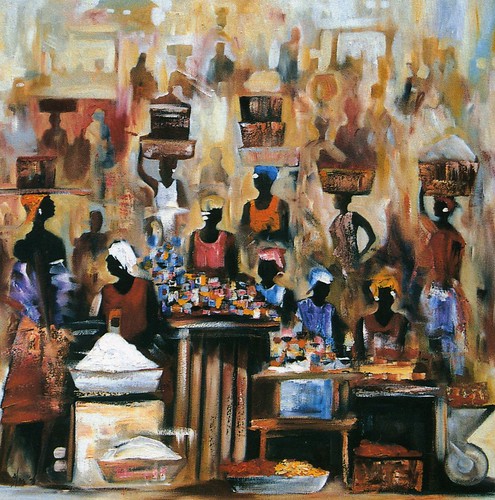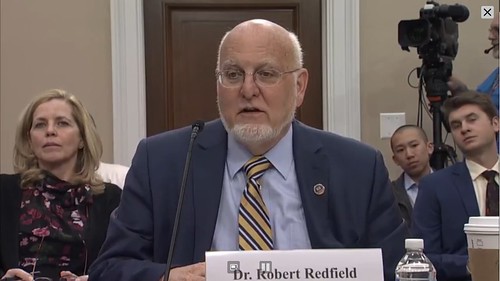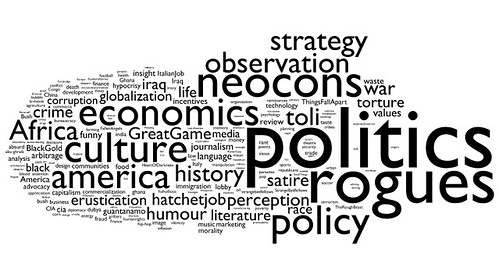Wishful Thinking
It is always a relief to believe what is pleasant, but it is more important to believe what is true.— Hilaire Belloc, The Silence of the Sea
The Sound of Anticipation
I guess I anticipated that the private sector would have engaged and helped develop it for the clinical side.— Robert Redfield, director of the CDC Congressional testimony (March 12 2020)
I keep coming back to this statement delivered, with a straight face, by Doctor Redfield in response to a rather sympathetic congressional audience. I assume that the congressmen and women's eyebrows arched violently at this verbal eruption. My eyebrows certainly assumed McDonalds' golden arch proportions when I read that soundbite.
Most American politicians only throw softballs - the business about scrutiny and oversight of the executive is mostly a fiction, and even the lawyers among them barely cross examine at the best of times. Even if you wing it and come unprepared, you should be able to dodge their inquiries. And yet this is the answer that a friendly congressman's pitch elicited: "I guess I anticipated that the private sector would have engaged..."
Slightly related: The Ayn Rand Institute bootstrapped its way to a PPP Loan of at least $350K. The institute's leadership had clearly done a close reading of their eponymous subject's The Virtue of Selfishness
In the hearings, there was not much more urgency, the outlines of the botched US federal response were already clear six weeks into the coronavirus pandemic. The main outrage in early March 2020 was that CDC did not have the testing capacity, nor indeed did it look as if there was a plan to increase it. This, of course, in stark comparison to the war footing that China, Taiwan, Vietnam and other countries had taken. And so, for example, the Democratic congresswomen were complaining that passengers on cruise ships were not being notified that they might have been exposed to the fast spreading clumps of viral RNA even weeks after exposure and so might have been unwittingly contributing to superspreading events.
If the leader of the public health response was freely signalling his belief that it was all a matter for private sector engagment, we were clearly in troubled waters. This seemed to be a foundational sin: the United States's public health response to our covidious predicament was flawed at conception.
Then I read the delicious sentence in the Financial Times that "Dr Anthony Fauci – the infectious disease expert and now household name – is widely known to loathe Redfield, and vice versa." I am up to 25 stanzas imploring Dear Kindly Doctor Fauci to step in and sort things out, but perhaps he might have had reason for his assumed assessment of Dr Redfield. With hindsight, when you watch the footage of Fauci and Redfield testifying while seated next to each other, you note that Redfield calls Fauci, Tony, whereas it is always "Doctor Redfield" in the other direction. Not to digress further, but one wonders if sharp-elbowed bureaucratic infighting is part of the reason for the dysfunction we have witnessed. Reading that CDC testing guidelines were relaxed only when the good Doctor Fauci was in surgery is of a piece with this pattern of neglect.
Still, one shouldn't personalize things since I am using "Redfield" as a shorthand for a kind of evidence-free, faith-based ideological thinking. It's a marker for a blindspot of sorts, an Anglosphere take on magical realism. Others have followed this line of thinking
Here were two men wondering aloud why reality had failed to conform to their ideology. Where was the private sector, exactly, during these eight weeks? How odd that these companies, whose only responsibility is to their shareholders, had failed to make up for the incompetence of this administration.Redfield seems to have been selected to run the CDC not only because he was a prominent virologist, which made him appear qualified for the job, but also because of his hard-line politics, which made him qualified to serve in this Republican administration. Even at the time of his appointment, a few experts tried to warn the administration that, as concerning as his dodgy politics were, his complete lack of experience in public health administration was even more disturbing. His politics, as it turns out, matter much more than his expertise when it comes to making a vital agency function.
The adherents of this kind wishful thinking will always observe in a crisis that "the private sector was too slow". They are forever singing the Dazz Band's chorus: "do I hear the sound of anticipation?" in advance of the second wave.
The next day, Congresswoman Katie Porter had had enough and brought out the whiteboard while questioning Robert Redfield and eventually got him to commit to free coronavirus testing. Her basic point was that the good doctor had ample authority in the context of a public health emergency to actually regulate the health care system. But it took relentless questioning, and she had to frame it like a game of The Price is Right to get him to admit that it might be a touch difficult for an uninsured American to pay the then-estimated $1,331 out-of-pocket cost of a coronavirus test, and that perhaps this might be an impediment to the WHO's injunction to "test, test, test" in light of a highly contagious disease to which humanity had no immunity.
Note: that it would take until September 1st for the full implications of actually exercising that regulatory authority to start to show. All of a sudden, we heard that the CDC could impose a moratorium on evictions, that it was well within its capacity to do so. There was no explanation on why it had taken more than 6 months to make that determination, and, as for all those lives that had been upended in the interim, the families put on the street, those made unemployed or forced to return to work in unsafe Smithfield plants for fear of the bread line, oh well c'est la vie. A blind man could see the need for even these half measures, as the Godfather of soul sang. Or perhaps, we can turn to Upton Sinclair
"It is difficult to get a man to understand something, when his salary depends upon his not understanding it."John Kenneth Galbraith was less cynical but no less piercing in outlining the workings of wishful thinking when he cast his eye on The Great Crash of 1929:
By affirming solemnly that prosperity will continue, it is believed that one can help insure that prosperity will in fact continue. Especially among businessmen the faith in the efficiency of such incantation is very great.
As with public health so with the economy. I've previously pointed to the figure of Alan Greenspan whose lifelong herculean efforts to tilt the playing field in the economy towards the rich were shown up to be similarly catastrophic in fomenting a modern Depression. Even his mea culpa has proven to be ephemeral
"I made a mistake in presuming that the self-interests of organisations, specifically banks and others, were such that they were best capable of protecting their own shareholders and their equity in the firms"
Ha ha ha ha ha ha. Pardon my visceral reaction. GTFOHWTBS
It was a strategic retreat however, in light of the Great Recession and the housing bubble. Still, the rehabilitation campaign for this disastrous legacy was immediately launched and, more importantly, there was no restitution or move to address the fundamental inequality that Greenspan advocated and, indeed, enabled. The great cheerleader of unrestrained capitalism had set the system in place and the rigged game continues apace.
There is, of course, a difference between the theory and the practice of free markets. Charicatures of Adam Smith notwitstanding, Bagehot's caveats are always ignored as inconveniences. As I wrote at the outset of the pandemic:
We'll be hearing a lot about the "lend freely" aspect of Bagehot's premise in the coming bailouts. We'll conveniently hear less about the "at a high rate" or the "solvent merchants" qualifiers. But those are the rules for banks foremost, and for businesses writ large.When it comes to bailouts for labor, moral hazard suddenly leaps to the front of the political arguments. The language is of handouts and welfare. Means testing inevitably raises its head. Social insurance has always needed better PR if not crises of power (Bismarck, FDR, Bevan)
A difficulty for the rest of us is determining whether the Redfield-Greenspan outlook was a sincere belief or a convenient cover story. It's a puzzle: are they in on the con or merely naive? Are they a mark or is it part of the long con? Should we consider them like the character played by Robert Redford in The Sting, actors in double and triple crosses? I do not mean to suggest Robert Redfield should be played by the Sundance Kid when the tales are told by Hollywood, but it's quite the ambiguous adventure.
Perhaps it doesn't matter, because the end result is the same grift, it's a shell game nonetheless, and one should protect oneself accordingly. We should fight the good fight against the soi-disant abstract magic of the market, even as one expresses one's outrage.
The pessimistic view is that we are dealing with gremlins, per Ezra Pound's Hugh Selwyn Mauberly
usury age-old and age-thick
and liars in public places.
The optimistic viewpoint is more charitable albeit that it is is a matter of routine greed. We can turn again to John Kenneth Galbraith for insight
The modern conservative is engaged in one of man's oldest exercises in moral philosophy; that is, the search for a superior moral justification for selfishness.Returning to Belloc's thought about wishful thinking, we can hear its rhyme with Francis Bacon's aphorism:
Hope is a good breakfast, but it is a bad supper.
In any case, the die is cast, the pursuit of herd immunity was the chosen tactic and we are all paying the cost in flesh and blood. 'Tis quite the pity that, in this pandemic, wishful thinking has lead the public health intervention.
"I guess I anticipated that the private sector would have engaged and helped develop it for the [insert topic here]" should be the epitaph of the wishful thinkers.
Wishful Thinking
Wishful thinking has been revealed as the bottom line
Their font of magical realism in a covidious time
An age-old shell game full of mystical narratives
The rhetoric of pocket book common sense and tough love
Merely masked the underlying impunity and strife
Force majeure, they vouchsafed bailouts for finance
But look, all of a sudden, central bankers turn to doves
Then the quick turn, post-haste, to restore the balance
We started hearing of moral hazard and hard choices.
For businessmen with hard noses, it's called strategic default
For your ordinary Joe, it's eviction and the bread line
Rent is due, sucker, it's your fault, not mine
Public health can wait, let's have a grand reopening
Never mind The Mosquito Principle or social living
Individual choice will save us, communal thinking is in the tank
Pull yourself up by your bootstraps, there's always the food bank
Governments can socialize the losses, of course, for the bosses
Meanwhile you're on your own, the workers can pay the cost
There's the incantation of free enterprise almost to the point of rapture
When the abiding principle is really that of regulatory capture
Crush the unions, we worship at the altar of the free market
Still, the world is watching, the crisis is having a clarifying effect
It's proving hard to deny the phantom thread of greed
When our human infrastructure is shown to be in dire need
Everything must change, this is school of hard knocks
Essential workers and labor are shown to be in the dock
The spokesmen of capital momentarily in a state of shock
Revealingly, the operative phrase is "human capital stock".
Soundtrack for this note
Let's have a soundtrack for this worldview. What to call it though? Regulatory Capture is argumentatative as well as being a mouthful. Free Markets doesn't get to my intent and Lightweight Regulation reeks of irony. It's not quite Social Darwinism and I already have a Manifest Destiny and a Shell Games playlist. Arggh let's go with Wishful Thinking. In the context of the US and UK responses to our covidious predicament, it clearly fits the bill.
Wishful Thinking, a playlist
The sounds of magical realism in the human marketplace. (spotify version)
- Magical Mystical Way by Omar
- I Wish by Dwele
- Magic by Amel Larrieux
- Everybody Has a Plan Until They Get Punched in the Mouth by Charlie Hunter
Mugged by reality in Mike Tyson's parlance with the incredible guitar of Charlie Hunter. One hopes America has the sense to follow through on its buyer's remorse instead of doubling down on wishful thinking. - Anticipation by Bar-Kays
- Regulate by Warren G ft Nate Dogg
- Wishing Well by Terence Trent D'Arby
- I Wish I Knew by Ahmad Jamal
- Market Place by Hugh Masekela
- You Can Make A Wish by Mica Paris
- Blind Man Can See It by James Brown
Paid the cost to be the boss - Human Market Place by Third World
- Free Enterprise by Rick Ross ft John Legend
The album is called Black Market - Market Place by Etta James
- I Wish by Stevie Wonder
- Nigerian Marketplace by Oscar Peterson Trio
- When The Party's Over by Alexander O'Neal
The walk of shame is in order.
Further Reading
Amitav Ghosh's excellent Ibis trilogy spends some time musing about the traders of the East India Company and the Opium Wars in River of Smoke and especially in Flood of Fire. Indeed it ought to continue further just for the sheer exuberance of the linguistic invention. Why stop at three novels?
The logical endpoint of free market thinking is the hypocrisy of empire.
I realised this was the inaugural moment in the wars of what you might call Free Trade Imperialism. These merchants were the first generation of people for whom Adam Smith’s ideas were like a religion. They really thought they were laws of nature"The profit motive has always existed, nowhere more so than in China and India, but Adam Smith created the idea that the economy is separate from human society and driven by its own internal forces. For the merchants, the market was not subject to any ethical constraints. Nobody in America [today] would suggest that Colombia has a right to push drugs in their country. But this was exactly what the Free Trade Fundamentalists were saying back then." In this, opium was uniquely suited to Smith’s purposes. “The whole point about capitalism is to try to persuade people to buy things that they don’t need," Ghosh argues. "It necessarily began with addictive substances. Tobacco, rum, tea, opium."
And the band played on...
This note is part of a series: In a covidious time
File under: shell game, con, capitalism, grifters, gremlins, culture, observation, perception, USA, markets, economics, politics, policy, public health, Observers are worried, poetry, covidious, greed, Buyer's Remorse, toli






















